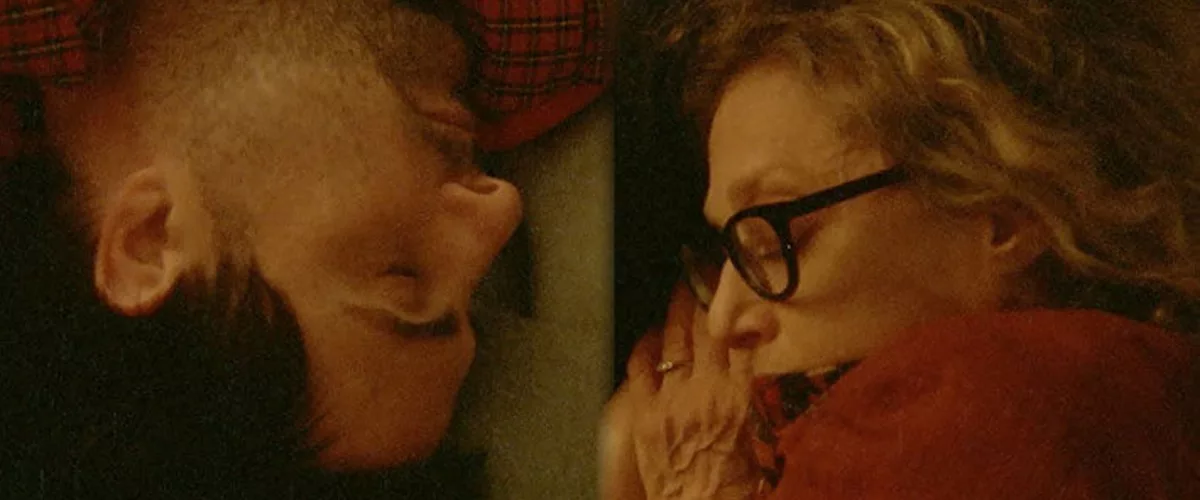
When we consider the “manic pixie dream girl”—that beautiful, free-spirited romantic interest who turns our repressed hero onto the joys of life—we immediately think of Natalie Portman in Garden State, Jennifer Aniston in Along Came Polly, and Drew Barrymore in, well, just about everything. But in some ways, the original manic pixie dream girl was Ruth Gordon as Dame Marjorie “Maude” Chardin in Hal Ashby’s cult classic, Harold and Maude.
In that film, our young hero was death obsessed and suicidal until a life force in the form of Gordon’s Maude lifted him from his malaise and taught him how to find mischievous and rebellious pleasure in life. The two commenced a love affair. The fact that Maude was 79 is, well, why it’s a cult classic.
Strangely, few films have replicated its particular formula. Nathan Silver’s Between the Temples is, rather explicitly, an homage to Harold and Maude, albeit a super Jewish one.
When we meet Ben Gottlieb (professional sad sack Jason Schwartzman) he’s going through a personal crisis that doubles as a metaphor—he’s a cantor who can’t sing. We find out that his novelist wife died earlier that year and, after moving out of the home they shared and moving in with his meddlesome lesbian mothers, he’s been a shell of a human—morose, passive, morbidly depressed.
Then along comes Polly, er, Carla (Carol Kane), who was Ben’s music teacher when he was a kid. She doesn’t recognize him at first, not so much because he’s aged, but because he’s lost his spark. Only when she sees a picture of Ben grinning on his driver’s license—before his wife’s death—does she place him.
She’s visiting Ben because she wants to be bat mitzvahed. She explains that she’s a recent widow who wants to fulfill her childhood dream. At first Ben says no, for reasons not completely clear. (As a cantor, he well knows that you need not be 13 to be bat mitzvahed.) But Carla hectors the rabbi (Robert Smigel), who relents. So Ben commences coaching Carla, who begins to chip away at his sadness. What Carla does (quite explicitly, in one drug-fueled encounter) is reintroduce Ben to who he used to be, the confident young man brimming with possibility. Figuratively and literally, she helps him regain his voice.
This material is a little mawkish, so Silver goes out of his way to make the film as edgy as possible, with some jangly handheld camera work, some dirty talk in a car next to a cemetery, and some unnecessarily grotesque closeups of Ben and Carla sharing a burger. Sometimes this works, as in during a disastrous family dinner scene toward the end of the film, but sometimes it feels gratuitous.
Of course, Ben’s moms (Dolly De Leon and Caroline Aaron) have no idea that he’s spending so much time with a little old lady. They keep trying to set him up with people. They invite a doctor to the house. At first, Ben thinks she’s a psychiatrist, which he reluctantly agrees he might need, only to discover that she’s a plastic surgeon. “You think I need work done?” he asks, confused. She’s a single doctor, one of his moms points out. Later, a woman shows up at the temple. She’s here for their Jdate, she says. Needless to say, Ben doesn’t have a Jdate account.
So yeah, Ben’s mothers are meddlesome yentas. It’s something of a Jewish stereotype that I wasn’t super keen on, although it’s mitigated by the fact that Silver himself is Jewish. Similarly, the rabbi, a cheater at golf who keeps Ben on as cantor because his moms make a sizeable donation to the temple, is another borderline caricature. At least the rabbi seems to have a genuine fondness for Ben—so much so that he wants to set him up with his daughter (Madeline Weinstein), recently dumped by her fiancé, and as much of “a mess” as Ben is.
She arrives to town and she’s pretty and a little quirky (she sheepishly does a terrible impression of Katharine Hepburn) and seems interested. By this point, Ben is much less zombified, thanks to Carla—and we think we know where this is going. Until we’re not sure.
The film has many pleasures, but the greatest has to be the return of Carol Kane, a seminal figure in ’70s and ’80s film and television, famed for her frizzy blonde hair, squeaky voice, and impeccable comic timing. I’m happy to report that she still looks great—and her acting is better than ever. (This is a performance that deserves Oscar consideration, although she might have to settle for an Indie Spirit nod.) To add some poignancy to the proceedings, her Carla once aspired to be a singer and even released an album. We see its cover—a hazy, period spot-on photo of a luminous young Kane, just as we remember her.
Between the Temples is often funny, sometimes uncomfortable to watch (intentionally), and, despite its flaws, quite moving. All hail the manic pixie dream senior.
